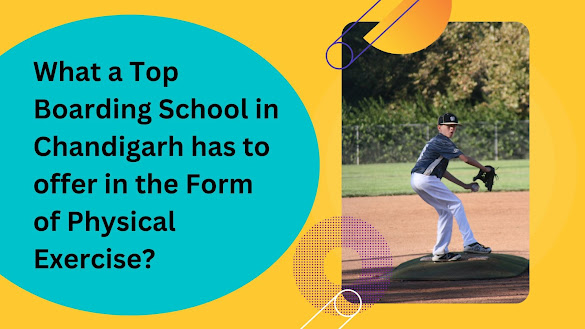What a Top Boarding School in Chandigarh has to offer in the Form of Physical Exercise?
A top boarding school in Chandigarh would likely offer a variety of physical exercise options to its students. These could include:
Team Sports: Popular team sports such as football, basketball, hockey, cricket, volleyball, etc. These sports not only promote physical fitness, but also teamwork, communication, and leadership skills.
Individual Sports: Schools may also offer individual sports such as Tennis, Badminton, Table Tennis, and Athletics. These sports help students to improve their focus, discipline, and self-motivation.
Fitness Activities: Schools may also offer fitness activities such as weightlifting, yoga, and cardio classes to promote overall fitness and wellness.
Outdoor Activities: Many best CBSE schools in Chandigarh also offer outdoor activities such as rock climbing, hiking, camping, and adventure sports to help students develop confidence, resilience, and problem-solving skills.
Specialized Facilities: Many top boarding schools in Chandigarh also have specialized facilities such as swimming pools, gymnastics rooms, and outdoor tracks to promote physical fitness and wellness.
Physical Education classes: Physical education classes are also mandatory in most schools which help to improve the physical fitness best sports facility school in Haryana, coordination, and fine motor skills of students.
It's important to note that the variety and specific options available would depend on the school, and the facilities and resources they have on hand.
1. Physical Exercise Helps in Warding Off Diseases
Physical exercise has many health benefits, one of which is the ability to help ward off diseases. Regular physical activity can help to improve overall health and fitness and can reduce the risk of developing various diseases and health conditions.
Cardiovascular Disease: Regular physical exercise can help to improve cardiovascular health by strengthening the heart and blood vessels, and reducing the risk of heart disease, stroke, and high blood pressure.
Diabetes: Exercise can help to improve insulin sensitivity and glucose metabolism, reducing the risk of type 2 diabetes.
Cancer: Regular physical activity has been linked to a reduced risk of certain types of cancer, such as breast and colon cancer.
Obesity: Physical exercise is an important aspect of weight management and can help to prevent obesity and maintain a healthy weight.
Osteoporosis: Weight-bearing exercises, such as running and weightlifting, can help to strengthen bones and reduce the risk of osteoporosis.
Mental Health: Regular physical exercise can also improve mental health by reducing stress, anxiety, and depression, and promoting positive mood.
Physical exercise not only improves physical health but also mental health, it is an important aspect of overall well-being and can help to prevent and manage a wide range of diseases and health conditions.
2. Physical Exercise Helps in Personality Development
Physical exercise can also play an important role in personality development.
Self-discipline and determination: Participating in physical exercise requires self-discipline and determination to stick to a regular routine and to push oneself to improve.
Self-confidence and self-esteem: Regular physical exercise can help to improve body image and self-confidence, and can boost self-esteem.
Leadership and teamwork: Team sports and group fitness classes can help to develop leadership and teamwork skills, as well as the ability to work well with others.
Goal-setting and achievement: Participating in physical exercise can help to develop goal-setting and achievement skills, as well as the ability to set and work towards personal fitness goals.
Stress management: Regular physical exercise can also help to manage stress and promote relaxation by releasing endorphins, also known as "feel-good" chemicals in the brain.
Time management: Participating in physical exercise also requires managing time effectively and planning ahead to fit it into a busy schedule.
Physical exercise can also help in developing a sense of responsibility, punctuality, and discipline. It can also help in building a strong mind, body, and spirit, which are all important aspects of personality development.
3. Physical Exercise Helps in Improving Mental Health
Physical exercise is known to have a positive impact on mental health. Regular physical activity can help to reduce symptoms of depression, anxiety, and stress, and improve overall mental well-being.
Stress Management: Physical exercise can help to reduce stress by releasing endorphins, which are chemicals in the brain that act as natural painkillers and mood elevators.
Anxiety and depression: Exercise has been found to be as effective as medication for reducing symptoms of anxiety and depression. Regular physical activity can help to improve mood and reduce feelings of anxiety and depression.
Cognitive function: Exercise has been found to improve cognitive function, including memory, attention, and executive function.
Self-esteem and self-worth: Regular physical exercise can also help to improve self-esteem and self-worth by promoting a positive body image and helping people to feel more in control of their physical health.
Sleep: Exercise can also help to improve sleep by reducing insomnia and promoting deeper and more restful sleep.
Social interaction: Physical activity can also be a social activity, which provides an opportunity to interact with others, and can help to build a sense of community and connection.
Physical exercise is an important aspect of overall well-being and can help to improve mental health by reducing symptoms of depression, anxiety, and stress, and promoting positive mood and cognitive function.



.jpg)
Comments
Post a Comment